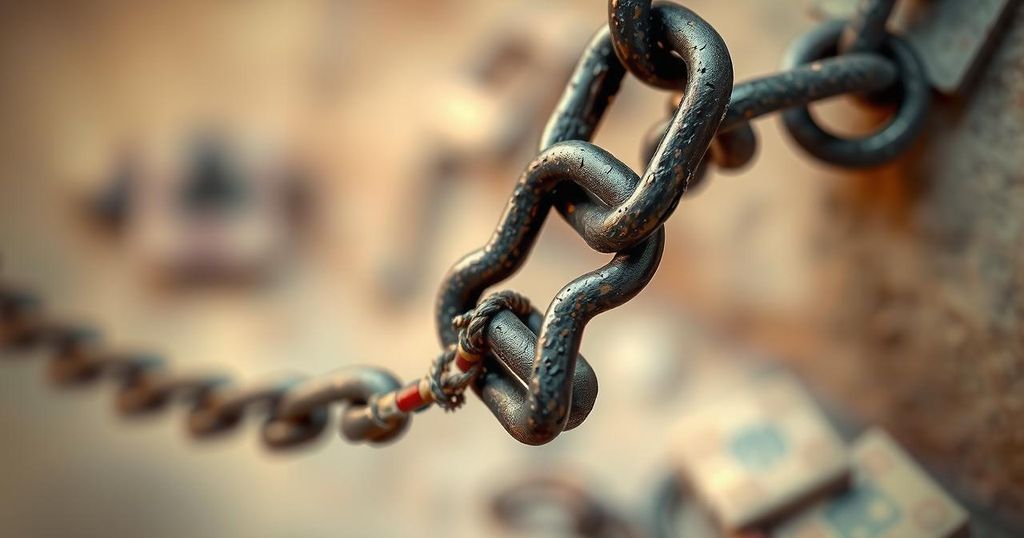The U.N. has condemned the use of sexual violence as a weapon of war in the eastern DRC, where intensified fighting between the M23 rebels and government forces has led to a rise in such atrocities. Reports indicate over 200 instances of sexual violence amidst a broader humanitarian crisis as conflict escalates, prompting urgent calls for protection and accountability.
Amid escalating conflicts in the eastern Democratic Republic of Congo (DRC), the Office of the High Commissioner for Human Rights has raised alarms over the alarming use of sexual violence as a tactical weapon in warfare. Jeremy Laurence, spokesperson for U.N. human rights chief Volker Türk, characterized conflict-related sexual violence as a distressing hallmark of armed conflicts in the region, underscoring the urgency of addressing this matter as tensions intensify.
The ongoing military strife involves the Congolese government and the M23 rebel group, which the DRC has labeled a terrorist organization. The situation has further deteriorated with allegations from Kinshasa of Rwandan support for the M23 rebels. Conversely, Rwanda has accused the DRC of collaborating with Hutu militants tied to the 1994 Rwandan genocide, amplifying regional tensions and complicating peace efforts amid the humanitarian crisis.
Reports indicate an alarming rise in incidents of sexual violence, particularly following the M23’s recent takeover of Goma, North Kivu’s capital. Since the onset of hostilities, the United Nations has documented over 200 instances of rape and sexual violence, although actual figures may be significantly higher due to underreporting driven by social stigma and fear.
Additionally, rising violence poses serious public health risks, particularly to pregnant women, as highlighted by Tarik Jasarevic from the World Health Organization. The region faces ongoing crises with malaria, measles, and cholera, exacerbating the spread of diseases amid conflict. The unfolding situation has resulted in at least 700 deaths and over 2,800 injuries since Sunday.
DRC Foreign Minister Therese Kayikwamba Wagner has accused Rwanda of illegally occupying parts of the DRC via proxies, while Rwanda’s government spokesperson has denied such allegations, asserting that their troops are positioned purely for protective measures. This diplomatic standoff complicates efforts toward stabilization and peace in the volatile region.
Laurence revealed the extent of sexual violence allegedly perpetrated by various factions in the conflict, noting reports of gang rapes by Congolese troops. The U.N. human rights office is validating reports that 165 women were raped during a recent prison break amid escalating violence, highlighting the grave humanitarian crisis unfolding in the area.
Furthermore, the International Organization for Migration (IOM) reported massive displacements in response to ongoing violence, with many internally displaced persons fleeing Goma. Amy Pope, IOM Director General, stated that millions already displaced by previous conflicts face increased humanitarian challenges as fighting intensifies, raising urgent calls for assistance and protection for affected populations.
M23’s aggressive advances deepen the crisis, with reports of their involvement in forced conscription and occupation of civilian facilities, including schools and hospitals. U.N. High Commissioner Volker Türk emphasized the significant risks posed by the proliferation of weapons, calling for urgent protection measures for civilians and accountability for violations against human rights.
The situation in the eastern Democratic Republic of Congo (DRC) has been marked by persistent violence and instability, primarily due to ongoing conflict between government forces and armed groups, notably the M23 rebel faction. The humanitarian crisis has resulted in massive displacement of civilians and a marked increase in sexual violence, often employed as a weapon of war. Efforts for resolution and safety are complicated by geopolitical tensions with neighboring Rwanda.
In conclusion, the alarming rise in sexual violence in the eastern Democratic Republic of Congo as a weapon of war requires urgent intervention. The ongoing conflict between various parties exacerbates humanitarian crises, highlighting the critical need for international cooperation in seeking peace, accountability, and support for vulnerable populations affected by violence. The protection of civilians should remain a priority amid escalating tensions and violence in the region.
Original Source: www.voanews.com






